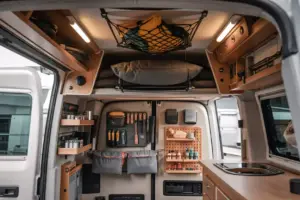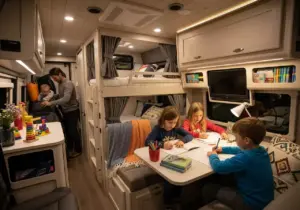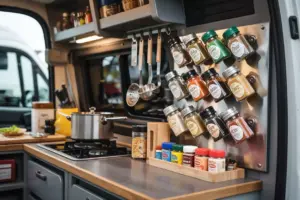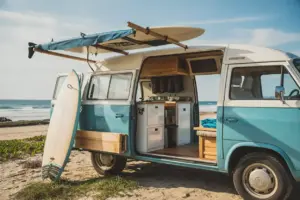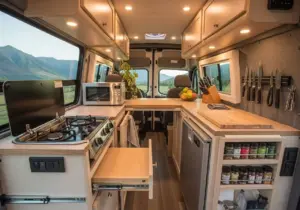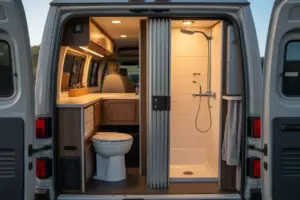Winter RV Camping: Essential Tips for Staying Warm, Safe, and Cozy
Picture this: fresh snow blankets the landscape around your RV while you sip hot cocoa by a crackling campfire, watching the aurora dance across a crystal-clear winter sky. Winter RV camping transforms the great outdoors into a magical wonderland, but it also presents unique challenges that can turn your dream getaway into a frozen nightmare if you’re unprepared.
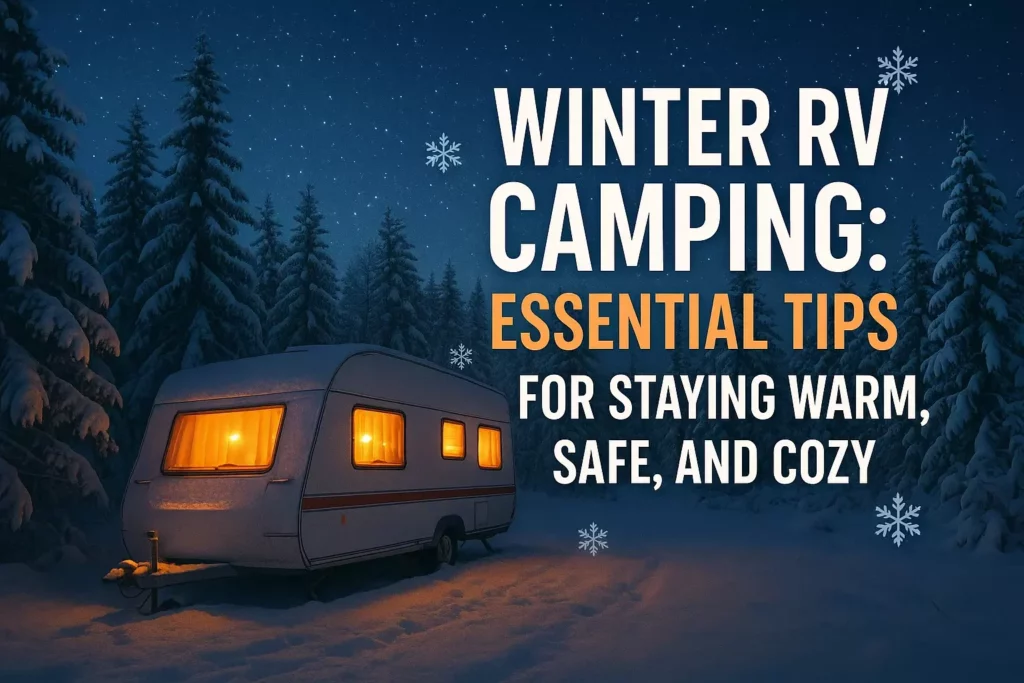
Winter RV camping isn’t just about bundling up and hoping for the best. It requires careful planning, specialized equipment, and proven strategies to keep you warm, safe, and comfortable when temperatures drop below freezing. Whether you’re a seasoned RVer looking to extend your camping season or a winter enthusiast ready to embrace the chill, mastering these essential techniques will ensure your cold-weather adventures are memorable for all the right reasons.
Key Takeaways
- Proper insulation and heating systems are crucial for maintaining comfortable temperatures and preventing frozen pipes in your RV
- Winterizing your RV’s plumbing system protects against costly freeze damage and ensures access to fresh water
- Strategic campsite selection and setup can significantly reduce exposure to harsh winds and improve overall comfort
- Emergency preparedness and safety protocols are essential when camping in remote winter locations with limited rescue access
- Quality cold-weather gear and clothing form the foundation of successful winter RV camping experiences
Essential Preparation for Winter RV Camping
Pre-Trip RV Inspection and Maintenance
Before embarking on any winter RV adventure, conducting a thorough inspection ensures your vehicle can handle harsh conditions. Start by examining your RV’s heating system, including furnace operation, propane connections, and ventilation. Check all seals around windows, doors, and slide-outs for air leaks that could compromise warmth and efficiency.
Critical maintenance checklist:
- Test heating systems and backup heat sources
- Inspect propane tanks and connections for leaks
- Examine roof and exterior for damage or weak points
- Verify electrical systems and battery capacity
- Check tire condition and tread depth for winter driving
Your RV’s insulation plays a vital role in maintaining comfortable temperatures. Identify areas where cold air might enter and warm air could escape. Common problem spots include floor vents, cabinet gaps, and areas around plumbing fixtures.
Winterizing Your RV’s Water System
Protecting your RV’s plumbing from freeze damage requires a multi-layered approach. The key is maintaining water flow and preventing stagnation in vulnerable areas. Install heat tape on exposed pipes and water lines, focusing on areas beneath the RV and in unheated compartments.
Consider upgrading to a four-season RV model if you plan regular winter camping. These units feature enhanced insulation, enclosed underbellies, and heated storage compartments designed specifically for cold-weather use.
Water system protection strategies:
- Use RV antifreeze in drain traps and toilet bowls
- Install pipe insulation and heat tape on vulnerable lines
- Keep cabinet doors open to allow warm air circulation
- Maintain a steady drip from faucets during extreme cold
- Monitor water tank levels and prevent complete freezing
Top Tips for Winter RV Camping Success
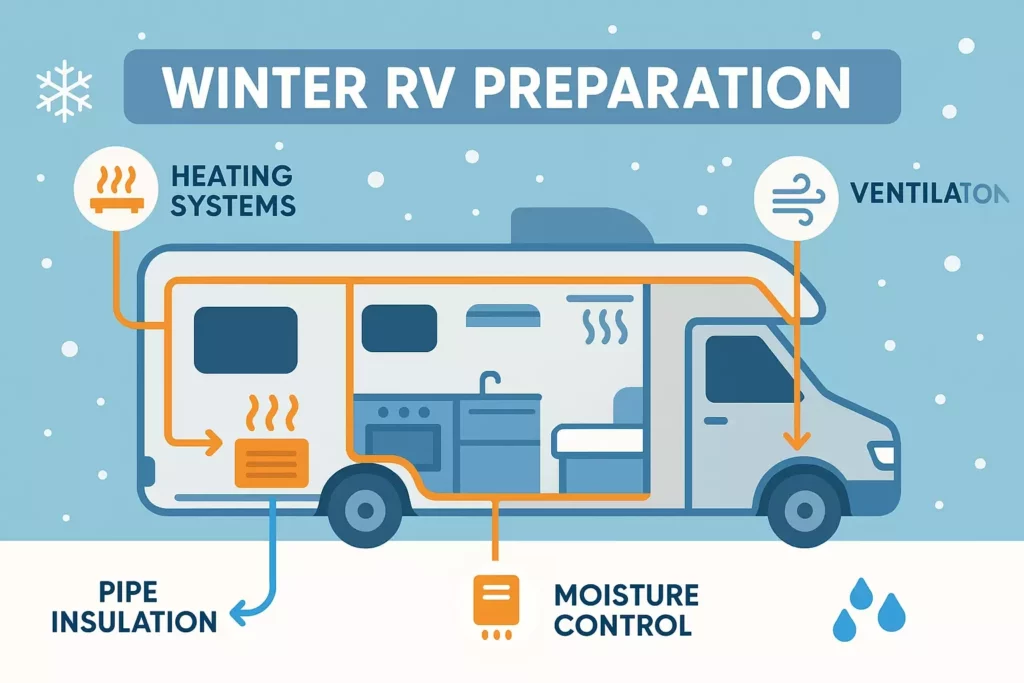
Heating Strategies and Energy Management
Effective heating goes beyond running your RV’s furnace at maximum capacity. Develop a comprehensive heating strategy that balances comfort, safety, and energy efficiency. Tips for winter RV camping include using multiple heat sources to distribute warmth evenly throughout your living space.
Propane furnaces work well but consume significant power for blower fans. Supplement with ceramic heaters, which provide targeted warmth without draining your battery. Always ensure proper ventilation when using any heating device to prevent carbon monoxide buildup.
“The secret to comfortable winter RV camping isn’t just staying warm—it’s managing moisture, conserving energy, and maintaining proper ventilation while keeping the cold at bay.”
Energy-efficient heating tips:
- Close off unused areas to concentrate heat
- Use thermal curtains and window coverings
- Position space heaters strategically for maximum coverage
- Dress in layers and use quality sleeping bags designed for cold weather
- Cook warm meals to add heat and humidity to your RV
Insulation and Moisture Control
Moisture management becomes critical during winter camping as temperature differences between inside and outside create condensation problems. Excess moisture leads to mold, mildew, and uncomfortable humidity levels that make your RV feel colder than it actually is.
Install moisture absorbers throughout your RV and ensure adequate ventilation. Crack a roof vent slightly to allow moisture-laden air to escape while maintaining overall warmth. Use exhaust fans when cooking or showering to remove humidity at its source.
Moisture prevention techniques:
- Run exhaust fans during cooking and bathing
- Use moisture absorbers in closets and storage areas
- Wipe down windows and surfaces regularly
- Avoid drying wet clothes inside the RV
- Maintain proper air circulation throughout the living space
Campsite Selection and Setup for Winter Conditions
Choosing the Right Winter Camping Location
Strategic campsite selection significantly impacts your winter camping experience. Look for locations that offer natural windbreaks like trees or rock formations while providing adequate sun exposure during daylight hours. Avoid low-lying areas where cold air settles and creates frost pockets.
Research campgrounds that remain open during winter months and offer essential services like snow removal, emergency assistance, and reliable electrical hookups. Many popular summer destinations close seasonally, so advance planning prevents disappointment.
Ideal winter campsite features:
- Protection from prevailing winds
- Southern exposure for maximum sunlight
- Level ground for stable RV positioning
- Access to electrical hookups for heating
- Proximity to emergency services and supplies
Setting Up Your RV for Cold Weather
Proper RV positioning and setup create a foundation for comfortable winter camping. Park with your RV’s entry door facing away from prevailing winds and position slide-outs to minimize exposure to harsh weather. Level your RV carefully, as frozen ground makes adjustments difficult once temperatures drop.
Create wind barriers using tarps, portable screens, or natural features. Even small windbreaks significantly reduce heat loss and improve outdoor comfort. Consider setting up a sheltered area for outdoor activities and equipment storage.
❄️ Winter RV Camping Checklist
Stay organized and prepared for your cold-weather adventure
Safety Considerations for Winter RV Camping
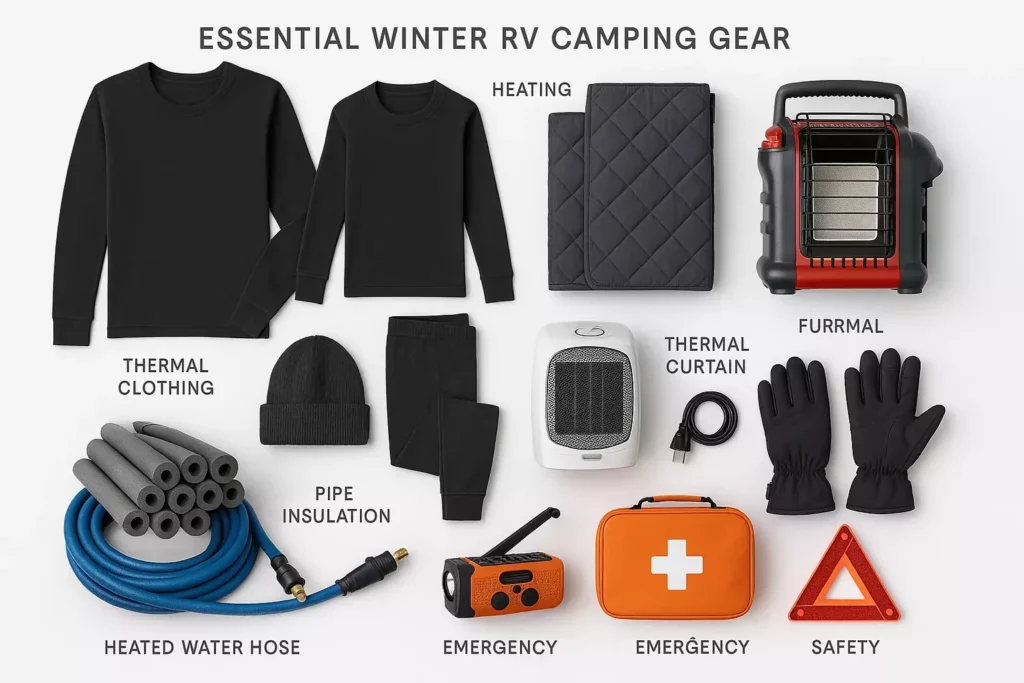
Emergency Preparedness and Communication
Winter camping in remote locations requires comprehensive emergency planning. Weather conditions can change rapidly, potentially cutting off access roads or creating dangerous situations. Develop a communication plan that includes multiple contact methods and regular check-ins with family or friends.
Pack emergency supplies for extended periods without outside assistance. Include extra food, water, medications, and heating fuel beyond your planned consumption. Consider investing in a satellite communicator for areas without cellular coverage.
Having a well-stocked first aid kit becomes even more critical during winter camping when medical assistance may be hours away. Include cold-weather specific items like instant heat packs, frostbite treatment supplies, and emergency shelter materials.
Essential emergency supplies:
- Extra propane tanks and heating fuel
- Emergency food supplies for 7-10 days
- Battery-powered or hand-crank radio
- Satellite communicator or emergency beacon
- Cold-weather medical supplies and medications
Carbon Monoxide Prevention
Carbon monoxide poses a serious threat during winter RV camping when heating systems run continuously and ventilation may be limited. Install battery-powered carbon monoxide detectors in multiple locations throughout your RV and test them before each trip.
Never use outdoor cooking equipment inside your RV, including camp stoves, grills, or generators. Ensure your RV’s furnace and water heater receive proper maintenance and ventilation. Keep exhaust vents clear of snow and debris that could block proper airflow.
Carbon monoxide safety measures:
- Install multiple CO detectors with fresh batteries
- Maintain proper ventilation even while heating
- Keep exhaust vents clear of snow and obstructions
- Never use outdoor equipment inside the RV
- Service heating appliances annually by qualified technicians
Clothing and Gear for Cold Weather Camping
Layering Systems and Insulation
Effective cold-weather clothing relies on layering systems that trap warm air while allowing moisture management. Start with moisture-wicking base layers that keep skin dry, add insulating mid-layers for warmth, and finish with waterproof outer shells for protection from wind and precipitation.
Avoid cotton clothing in cold conditions, as it retains moisture and loses insulating properties when wet. Choose synthetic materials or merino wool that maintain warmth even when damp. Understanding cool weather clothes for camping helps you select appropriate gear for varying conditions.
Effective layering components:
- Base layer: Moisture-wicking synthetic or merino wool
- Insulation layer: Down or synthetic fill jackets and pants
- Shell layer: Waterproof, breathable outer protection
- Extremities: Insulated boots, gloves, and warm headwear
- Sleep system: Cold-rated sleeping bags and insulated pads
Essential Winter Camping Equipment
Beyond clothing, specific equipment makes winter RV camping safer and more comfortable. Invest in quality items designed for cold-weather use rather than trying to adapt summer gear. Poor equipment performance in extreme conditions can create dangerous situations.
Portable equipment should include items for outdoor activities, emergency situations, and comfort enhancement. Consider weight and storage space when selecting gear, focusing on multi-purpose items that serve multiple functions.
Must-have winter camping gear:
- Insulated water bottles and thermoses
- Portable shovel for snow removal
- Ice scrapers and de-icing products
- Emergency shelter and survival supplies
- High-quality flashlights with extra batteries
Food and Water Management in Freezing Conditions
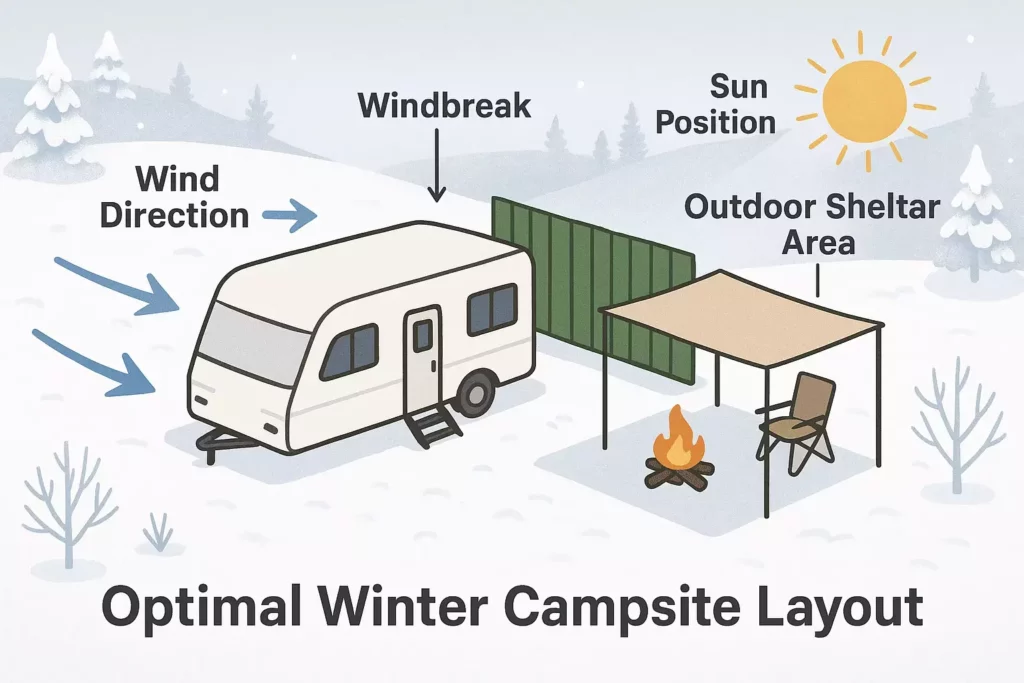
Preventing Water System Freeze-Ups
Water management becomes challenging when temperatures drop below freezing. Frozen pipes can burst, creating expensive damage and leaving you without essential services. Implement multiple strategies to keep water flowing and prevent system damage.
Monitor weather forecasts and take preventive action before temperatures reach critical levels. Understand your RV’s vulnerable points and focus protection efforts on these areas. Learning about water purification methods helps ensure safe drinking water when regular systems face challenges.
Water system protection strategies:
- Keep water flowing through occasional use
- Add RV antifreeze to drain traps and toilet bowls
- Use tank heaters and heated water hoses
- Insulate exposed pipes and connections
- Monitor tank levels to prevent complete freezing
Cold-Weather Cooking and Food Storage
Cooking becomes more important during winter camping as hot meals provide warmth and comfort while boosting morale during challenging conditions. Plan meals that are easy to prepare and provide adequate calories for cold-weather activities.
Food storage requires attention to freezing temperatures that can damage canned goods and fresh produce. Store temperature-sensitive items in heated areas of your RV and rotate stock to prevent spoilage. Consider freeze-dried and non-perishable options for extended trips.
Exploring campfire cooking techniques adds variety to your meal planning while providing additional heat sources outside your RV.
Winter Activities and Entertainment
Outdoor Recreation in Cold Weather
Winter camping opens up unique recreational opportunities unavailable during other seasons. Snowshoeing, cross-country skiing, and winter photography provide excellent ways to explore snowy landscapes while staying active and warm.
Plan activities appropriate for current weather conditions and your group’s skill level. Always inform others of your plans and expected return times when venturing away from your campsite. Carry emergency supplies and communication devices during all outdoor activities.
Popular winter camping activities:
- Snowshoeing and winter hiking
- Cross-country skiing and snowboarding
- Ice fishing and winter wildlife observation
- Winter photography and stargazing
- Snow sculpture building and outdoor games
Indoor Comfort and Entertainment
Extended time inside your RV during harsh weather requires planning for entertainment and comfort. Create a cozy atmosphere with warm lighting, comfortable seating, and engaging activities for all family members.
When camping with kids during winter, pack extra entertainment options and indoor activities to keep everyone occupied during storms or extremely cold periods. Consider educational activities that teach winter survival skills or nature appreciation.
Indoor entertainment ideas:
- Board games and card games for family fun
- Books, e-readers, and audiobooks for quiet time
- Craft projects and journaling activities
- Cooking projects and baking experiments
- Educational activities about winter ecology
Troubleshooting Common Winter RV Problems
Dealing with Frozen Pipes and Systems
Despite preventive measures, frozen pipes can still occur during extreme cold snaps. Know how to safely thaw frozen systems without causing damage. Never use open flames or high heat sources that could damage pipes or create fire hazards.
Start thawing efforts at the faucet end and work backward toward the source. Use hair dryers, warm towels, or space heaters to gradually warm frozen areas. If pipes have burst, shut off water supplies immediately and assess damage before continuing use.
Safe pipe thawing methods:
- Use hair dryers on low heat settings
- Apply warm (not hot) towels to frozen areas
- Position space heaters safely near affected pipes
- Open cabinet doors to allow warm air circulation
- Never use open flames or excessive heat sources
Power Management and Battery Conservation
Cold weather reduces battery capacity and increases power consumption for heating systems. Monitor your battery levels closely and implement conservation strategies to extend operating time between charges.
Reduce unnecessary electrical loads and prioritize essential systems like heating, lighting, and communication devices. Consider upgrading to lithium batteries that perform better in cold conditions than traditional lead-acid batteries.
Power conservation strategies:
- Use LED lighting to reduce electrical consumption
- Limit use of high-draw appliances during peak heating times
- Install solar panels with cold-weather performance ratings
- Carry backup power sources like portable generators
- Monitor battery voltage and charging system performance
Maintenance and Storage After Winter Camping
Post-Trip RV Inspection and Care
After winter camping trips, conduct thorough inspections to identify any damage or issues that developed during cold-weather use. Check for signs of moisture intrusion, frozen pipe damage, or heating system problems that require attention.
Clean and dry all equipment before storage to prevent mold and mildew growth. Service heating systems and replace filters that may have accumulated debris during winter use.
Post-winter maintenance checklist:
- Inspect water systems for freeze damage
- Clean and service heating equipment
- Check for moisture damage or leaks
- Replace air filters and clean ventilation systems
- Document any repairs needed for future trips
Preparing for Off-Season Storage
Proper storage preparation protects your RV investment and ensures readiness for future winter adventures. Winterize water systems completely if storing in freezing conditions, or maintain minimal heating if storing in climate-controlled facilities.
Remove all food items and clean thoroughly to prevent pest problems. Consider professional storage facilities that offer climate control and security monitoring for valuable RV investments.
Conclusion
Winter RV camping transforms the traditional camping experience into an extraordinary adventure filled with pristine landscapes, peaceful solitude, and unique challenges that create lasting memories. Success depends on thorough preparation, quality equipment, and respect for the power of winter weather.
The tips for winter RV camping outlined in this guide provide a foundation for safe and enjoyable cold-weather adventures. From protecting your RV’s systems against freezing to selecting appropriate clothing and gear, each element contributes to your overall success and safety.
Remember that winter camping skills develop through experience. Start with shorter trips in milder conditions before attempting extended stays in extreme cold. Build your confidence and equipment collection gradually while learning what works best for your specific RV and camping style.
Take action now to prepare for your winter RV adventure:
- Assess your current RV’s winter readiness and identify necessary upgrades or modifications
- Research winter camping destinations that match your experience level and interests
- Invest in quality cold-weather gear starting with essential safety and heating equipment
- Practice winter camping techniques during day trips or overnight stays close to home
- Connect with experienced winter RVers through clubs and online communities for additional tips and support
Winter RV camping rewards those who prepare properly with some of the most beautiful and peaceful camping experiences available. The silence of snow-covered forests, the brilliance of winter stars, and the satisfaction of staying comfortable in challenging conditions create memories that last a lifetime.
Whether you’re extending your camping season or discovering winter’s unique beauty for the first time, these essential strategies will help ensure your cold-weather adventures are safe, comfortable, and unforgettable. Embrace the challenge, respect the conditions, and enjoy the incredible world that winter camping reveals.
SEO Meta Information:
Meta Title: Winter RV Camping Tips: Stay Warm, Safe & Cozy Guide 2025
Meta Description: Master winter RV camping with expert tips for staying warm, safe, and comfortable. Essential gear, heating strategies, and safety advice for cold-weather adventures.

